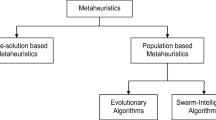Abstract
This paper proposes a new technique for assisting search technique optimizers (most evolutionary, swarm, and bio-mimicry algorithms) to get an informed decision about terminating the heuristic search process. Current termination/stopping criteria are based on pre-determined thresholds that cannot guarantee the quality of the achieved solution or its proximity to the optimum. So, deciding when to stop is more an art than a science. This paper provides a statistical-based methodology to balance the risk of omitting a better solution and the expected computing effort. This methodology not only provides the strong science-based decision making but could also serve as a general tool to be embedded in various single-solution and population-based meta-heuristic studies and provide a cornerstone for further research aiming to provide better search terminating point criteria.






Similar content being viewed by others
References
Al-Sheshtawi KA, Abdul-Kader HM, Ismail NA (2010) study of CLONALG, opt-IA, and BCA with numerical optimization problems. Int J Comput Sci Netw Secur 10(4):24–30
Andre J, Siarry P, Dognon T (2001) An improvement of the standard genetic algorithm fighting premature convergence in continuous optimization. Adv Eng Softw 32(1):49–60
Bhandari D, Murthy CA, Pal SK (2012) Variance as a stopping criterion for genetic algorithms with elitist model. Fund Inform 120(2):145–164
Blum C, Roli A (2003) Metaheuristics in combinatorial optimization: overview and conceptual comparison. ACM Comput Surv (CSUR) 35(3):268–308
Brownlee J (2005) Clonal selection theory & clonalg-the clonal selection classification algorithm (csca). Swinburne University of Technology, Swinburne, Australia
Chitra S, MadhuSudhanan B, Rajaram M, Sivanandham SN (2010) Investigation of data clustering preprocessing algorithm on independent attributes to improve the performance of CLONALG. Int J Comput Sci Eng 2(1):8–11
Clerc M, Kennedy J (2002) The particle swarm-explosion, stability, and convergence in a multidimensional complex space. IEEE Trans Evol Comput 6(1):58–73
Du J, Leung JT (1990) Minimizing total tardiness on one machine is NP-hard. Math Op Res 15:483–495
Eiben AE, Aarts EH, Van Hee KM (1990) Global convergence of genetic algorithms: a Markov chain analysis. In: International conference on parallel problem solving from nature. Springer, Berlin, Heidelberg, pp 3–12
Glorieux E (2015) Constructive cooperative coevolution for optimising interacting production stations. Doctoral dissertation, University West
Godreche C, Majumdar SN, Schehr G (2009) Longest excursion of stochastic processes in nonequilibrium systems. Phys Rev Lett 102(24):67
Gutjahr WJ (2014) A graph-based ant system and its convergence. Futur Gener Comput Syst 16(8):873–888
Ha MP, Kumar L, Ananthapadmanabha T (2014) A novel approach for optimal allocation of a distributed generator in a radial distribution feeder for loss minimization and tail end node voltage improvement during peak load. Int Trans Electr Comput Engine Syst 2(2):67–72
Hermadi CL, Sarker R (2014) Dynamic stopping criteria for search-based test data generation for path testing. Inf Softw Technol 56(4):395–407
Holland J (1992) Adaptation in natural and artificial systems: an introductory analysis with applications to biology, control, and artificial intelligence. MIT press, Cambridge
Kumar R, Rockett P (2002) Improved sampling of the Pareto-front in multiobjective genetic optimizations by steady-state evolution: a Pareto converging genetic algorithm. Evol Comput 10(3):283–314
Lenstra JK, Kan AR, Brucker P (1977) Complexity of machine scheduling problems, Annals of discrete mathematics. Elsevier, Amsterdam, pp 343–362
Liu HL, Gu F, Zhang Q (2014) Decomposition of a multi-objective optimization problem into a number of simple multi-objective sub-problems. IEEE Trans Evol Comput 18(3):450–455
Lundy M, Mees A (1986) Convergence of an annealing algorithm. Math Program 34(1):111–124
Morsanyi K, Primi C, Chiesi F, Handley S (2009) The effects and side-effects of statistics education: Psychology students’(mis-) conceptions of probability. Contemp Educ Psychol 34(3):210–220
Nearchou AC (2018) Multicriteria scheduling optimization using an elitist multiobjective population heuristic: the h-NSDE algorithm. J Heuristics 24:1–35
Nourani Y, Andresen B (1998) A comparison of simulated annealing cooling strategies. J Phys A: Math Gen 31(41):8373–8385
Pandey HM, Chaudhary A, Mehrotra D (2014) A comparative review of approaches to prevent premature convergence in GA. Appl Soft Comput 24:1047–1077
Rangaiah GP, Sharma S, Lin HW (2017) Evaluation of two termination criteria in evolutionary algorithms for multi-objective optimization of complex chemical processes. Chem Eng Res Des 124:58–65
Rawlins GE, Sushil JL (1993) Syntactic analysis of convergence in genetic algorithms. Found Genet Algorithms 2:141–151
Rudolph G (1994) Convergence analysis of canonical genetic algorithms. EEE Trans Neural Netw 5(1):96–101
Saxena DK, Sinha A, Duro JA, Zhang Q (2016) Entropy-based termination criterion for multiobjective evolutionary algorithms. EEE Transactions on Evolutionary Computation 20(4):485–498
Segura C, Hernández-Aguirre A, Luna F, Alba E (2016) Improving diversity in evolutionary algorithms: New best solutions for frequency assignment. IEEE Trans Evol Comput 21(4):539–553
Solis FJ, Wets RJ (1981) Minimization by random search techniques. Math Oper Res 6(1):19–30
Squillero G, Tonda A (2016) Divergence of character and premature convergence: A survey of methodologies for promoting diversity in evolutionary optimization. Inf Sci 329:782–799
Toledo CFM, Oliveira L, França PM (2014) Global optimization using a genetic algorithm with hierarchically structured population. J Comput Appl Math 261:341–351
Tuyl F, Gerlach R, Mengersen K (2008) A comparison of Bayes-Laplace, Jeffreys, and other priors: the case of zero events. Am Stat 62(1):40–44
Wolpert DH, Macready WG (1997) No free lunch theorems for optimization. IEEE Trans Evol Comput 1(1):67–82
Author information
Authors and Affiliations
Corresponding author
Additional information
Publisher's Note
Springer Nature remains neutral with regard to jurisdictional claims in published maps and institutional affiliations.
Rights and permissions
About this article
Cite this article
Etgar, R., Cohen, Y. Optimizing termination decision for meta-heuristic search techniques that converge to a static objective-value distribution. OR Spectrum 44, 249–271 (2022). https://doi.org/10.1007/s00291-021-00650-z
Received:
Accepted:
Published:
Issue Date:
DOI: https://doi.org/10.1007/s00291-021-00650-z




